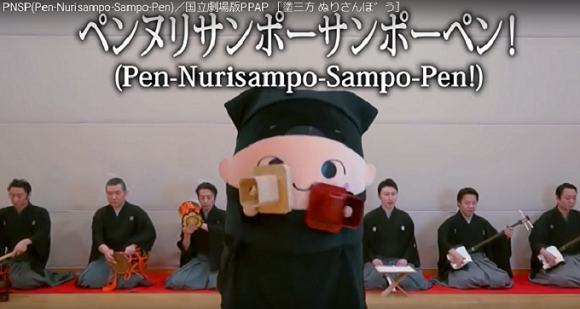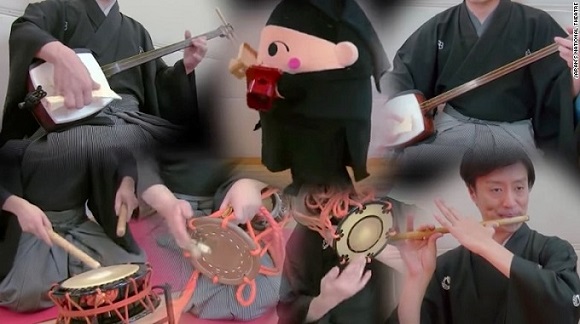

ピコ太郎のPPAPを、日本の歌舞伎で使われる伝統楽器で演奏したパロディ動画が、YouTubeで大人気という話と、その背景について書かれています。 この1分半ほどの動画、初めは「何だこれ~?」でしたが、思わず吹き出してしまう場面もあったり、とても感動的でした。動画のリンクを貼ったのですが、残念ながら、今は見られないようです。(2021年12月)
↑長文読解の練習用にも、お使いください。(文法は高校レベル)
Japan's pineapple pen song goes highbrow with Kabuki makeover
(Cable News Network)
Now PikoTaro, the leopard print-clad singer endorsed by the likes of Justin Bieber and MIA is back -- albeit in a more old-school guise.

And their video's racked up more than 1.7 million views in the space of four days.
'Jam session'
They're joined by Saki Kineya, a young vocalist who comes from a family of traditional hougaku singers with a two-hundred-year lineage.

The National Theatre's official mascot Kurogo-chan performs Pen-Nurisampo-Sampo-Pen with a group of elite musicians.

The remixed version of PPAP featuring musicians from Japan's National Theatre and their mascot Kurogo-chan.
The publicity team pitched the idea to make a classical version to a group of musicians who usually provide the backing track to the National Theatre's Kabuki performances.
"The musicians were happy to be involved and have the opportunity to show people their craft," said Kirita. "It's not like we went in with a plan. The musicians decided how they'd reconfigure Piko Taro's song during a three-hour jam session."
Household name
PikoTaro himself is also enthusiastic about the National Theatre's rendition.
"This is an amazing collaboration between PikoTaro and the Japanese tradition piko. The 'earnest' and 'craziness' of Japan fusing together with the 'uhhh'," he told CNN.
⑥YouTube commentator Punie Tanaka suggested that even though people nowadays consider Kabuki as a formal, highbrow art, in reality, it had been created to amuse people.
"In some ways (the National Theatre's clip) marks a return to Kabuki's original light-hearted ways," wrote Punie.
Kirita told CNN that as young people in Japan had less interest in the traditional arts, the National Theatre had wanted to try something new and out-of-character to stay relevant.
"(PikoTaro's) a household name in Japan. Even my three-year-old knows about him," said Kirita.
以下、主節のVを赤で示しました。確認してみてください。
なお、個人名前や肩書の表記につきましては、確認していませんのでご容赦ください。
Japan's pineapple pen song/goes highbrow/ with Kabuki makeover
highbrow=ハイブラウ=知識人、《形》教養のある、インテリ向きの⇔lowbrow=無教養な brow=ブラウ=まゆげ=eyebrow
makeover=改善、イメージチェンジ
It has had a complete makeover.=それは完全なイメチェンをしました。
日本のパイナップル・ペンの歌は/インテリ向きになっています。/歌舞伎の改善で。(→歌舞伎に変革をもたらして)
Updated 0913 GMT (1713 HKT) January 17, 2017
![]()
Story highlights:
話のハイライト〔呼び物〕
PNSP is Japan's National Theatre's first attempt/ at a YouTube promo clip.
promo(s)=プロウモウ=宣伝広告(の)
clip=刈り込み、新聞の切り抜き、(テレビい挿入される)放映用映像フィルム
PNSPは、国立劇場の最初の試みです。/YouTubeの宣伝広告フィルムでの。
Pen-Nurisampo-Sampo-Pen remixes PikoTaro's viral hit/ with traditional Japanese music.
remix=リミックスゥ=~をミキシングし直す、~を再び混ぜる
viral=ばイラる=ウィルスの、ウィルスによって起こる
ペン‐塗り三宝‐三宝‐ペンは、ピコ太郎のウィルス性の(?)大ヒットをミキシングし直しています。/伝統的な日本の音楽と。
![]()
①Remember /that Japanese comedian/ who set the internet on fire/ with a song about
a pineapple apple pen?
Remeber→Do you remeber *that=接続詞が来ることも多いが、ここでは、後にs'v'がないので、指示代名詞
set O on fire=set fire to O=~に火をつける、~を興奮させる
覚えていますか。/あの日本のコメディアンを/インターネットを興奮させた/パイナップル アップル ペンについての歌で。
Now/ PikoTaro,/ the leopard print-clad singer/ endorsed by the likes of Justin Bieber and MIA/ is back /-- albeit in a more old-school guise.
print=プリント模様
clad=クらッドゥ=《文・複合語で》~を着た
snow-clad mountains=mountains clas in snow=雪で覆われた山々
endorse=エンドースゥ=~に裏書きする、~を支持する=support
likes=好み
albeit=オるビーイットゥ=《正式・省略節で》~にもかかわらず
=although, even though
guise=ガイズゥ=外観(=appearance)、身なり(=costume)
今/ピコ太郎は/ヒョウ柄を着た歌手の(←ピコ太郎と同格)/ジャスティンビーバーとMIAの好みによって支持されていますが(←endorsedはピコ太郎を形容する分詞)/戻ってきました。(←主節の動詞は、このis。現在形。「戻ってきています」の意)/(もっと)昔の学校の身なりですが。
②Japan's National Theatre /-- better known for puppet shows and traditional drama Kabuki -- /has taken inspiration/ from PikoTaro's viral YouTube clip PPAP (Pen-Pineapple-Apple-Pen).
日本の国立劇場は/人形劇と伝統的な演劇の歌舞伎でよりよく知られていますが/インスピレーション(着想、ヒラメキ閃き)を得ました/ピコ武郎の活気のあるユーチューブのフィルム(作品)PPAP(ペンーパイナップルーアップルーペン)から。
come up with=~を思いつく、~を提案する(propose)
parody=パロディ=パロディ、下手な物まね(bad imitation)
in a bit to do=~しようとして
bit=値をつける、得ようと努力する〔for〕、入札、努力、せり(札の宣言)
彼らは、彼ら自身のPPAPパロディを思いつきました。/つまりPNSP(ペンー塗り三宝ー三宝‐ペン)を/伝統的な日本の芸能への関心を復活させようとして。
And their video's racked up more than 1.7 million views/ in the space of four days.
rack up=~を成し遂げる、~を得る cf. rake up=~をかき集める
rack=ラック(~掛け)、拷問(台)、〔ビリヤードの三角形の枠の〕ラック、
〔家賃など〕を搾り取る、〔be racked by/with〕~で苦しむ、
space=空間、〔a~、the~〕期間
for the space of five years=5年間 (←最近の若者はあまり使わない表現)
そして、彼らのビデオは、170万以上の視聴を得ました(→170万回以上再生されました)(←video's racked=video has racked現在完了)/4日間で。
'Jam session'
③In the parody, /a group of elite Japanese musicians/ clad in formal outfits/ re-imagine PikoTaro's song/ with the help of Kurogo-chan,/ the theater's stagehand mascot.
elite=エりートゥ=エリート(の)、精鋭
clad=クらッドゥ=(~を)着た,(~に)覆われた
outfit=アウトふィットゥ=装備一式、〔装身具などを含む〕服装一式
reimagine=リイマジンヌ=~を作り変える
stagehand=ステイジハンドゥ=舞台係、裏方、(黒子)
①パロディの中で/③精鋭の日本の音楽家の1グループが/②正式な服装一式をまとった(音楽家)/⑥ピコ太郎の歌を作り変えます。/⑤黒子ちゃんの助けで(→助けを借りて)/④劇場の裏方のマスコット(の黒子ちゃん)。
(←動詞がre-imagineということに注意!〇内の番号順に訳せば、意訳になります。)
current=カレントゥ=今の(=present)、最新の(=up-to-date)、流れ
production=生産(量)、創作品、制作、上演、演出
retro=レトロウ=昔風の、リバイバル(の)
lacquer=らッカー=漆、~に漆を塗る
そのビデオの中で//(そしてそれは)国立劇場の最新の歌舞伎の上演を促進するために企画されていますが(←--と--の間部分は説明であることが多いので、省略して読むと文意が把握しやすい。designedはvideoを形容する分詞)//音楽家たちはPPAPの拍子に合わせて演奏します。(perform toのtoは「~に合わせて」)/マスコットが動きをつける(←作る)一方(while=《接》~の間、~である一方)/りんごとペンを持たずに/しかし、昔風のペン、塗り三宝(神社で使われる漆で塗られた台)を持って/そして三宝(神社で使われる木製の台)(を持って)。
They're joined by Saki Kineya,/ a young vocalist/ who comes from a family of traditional hougaku singers/ with a two-hundred-year lineage.
vocalist=ぼウカりストゥ=歌手、ボーカル
lineage=りニエイジ=家系、家柄(=family line)
彼らは、キネヤ サキによって、参加されています(→キネヤ サキが加わっています)。/若い歌手の/伝統的な邦楽の歌い手の家系出身の(歌手)/2百年の(歴史のある)家柄をもつ(家族)。
"We didn't know/ what kind of reception we'd have/ and we were only hoping for around 100,000 views,"/ Kirita Koji/, a spokesperson from the National Theatre's publicity division, /told CNN.
reception=リセプションヌ=接待、評価、反響
spokesperson=代弁者、代表者、スポーウスマン(spokesman, representative)
publicity=プブりスィティ=周知(⇔privacy)、広告、宣伝広報
「私達はわかりませんでした。/私達がどんな種類の反響をもらうだろうか/そして、私達は、ただ10万くらいの視聴〔再生〕を望んでいました。」キリタ コウジは/国立劇場の広報部からの代表(ですが)《カンマ,とカンマ,の間部分は説明であることが多いので、省略して読むと文意が把握しやすい。》/CNNに言いました。
《The National Theatre's official mascot Kurogo-chan performs Pen-Nurisampo-Sampo-Pen/ with a group of elite musicians.》
《国立劇場の公式マスコットの黒子ちゃんは、ペンー塗り三宝ー三宝ーペンを演じます。/精鋭の音楽家の1グループと一緒に。》
《The remixed version of PPAP/ featuring musicians from Japan's National Theatre and their mascot Kurogo-chan.》
《PPAPのミキシング版/日本の国立劇場からの音楽家と彼らのマスコット黒子ちゃんを特集する(バージョン)》
reference=リふァレンスゥ=参照、関係、言及、~を参考にする
①キリヤによると/⑦国立劇場の広報チームは、宣伝広告のビデオのためのアイデアを得ました。/②日本の最も尊敬されている歌舞伎俳優の7代目尾上菊五郎が(言及した)時/⑥言及した(時)/⑤彼がピコ太郎の歌を参考にするかもしれないと/④彼の1月公演で/③2016年12月の記者会見の間に。
《←接続詞when以下が従属節。suggestedは従属節内の動詞。〇内の番号順に訳せば、意訳になります。》
The publicity team pitched the idea/ to make a classical version/ to a group of musicians/ who usually provide the backing track to the National Theatre's Kabuki performances.
pitch=~を投げる、(商品など)を売り込む
backing track=バッキングトラック(あらかじめ録音された伴奏)
=prerecorded background music (←前もって録音された背景音楽)
cf. elevator music=《米略》(公共の場所で流される)平凡で個性のない音楽
広報チームは、アイデアを売り込みました。/伝統的なバージョンを作るために/音楽家達のグループに(売り込んだ)/普通、国立劇場の歌舞伎公演のバッキングトラックを提供している(音楽家達)。
"The musicians were happy /to be involved/ and have the opportunity /to show people their craft,"/ said Kirita.
involve=インぼるぶ=~を巻きこむ、be~d=(よい意味で)参加する、携わる
craft=クラふトゥ=技術、手工芸
「音楽家たちは、喜びました.。/参加することを/そして、機会を持つことを/人々に、彼らの技術を見せる(機会を)。」/キリタは言いました。
"It's not like we went in with a plan.
The musicians decided/ how they'd reconfigure Piko Taro's song/ during a three-hour jam session."
go in with~=~に協力する、~に加わる
reconfigure=リコンふィギュア=~を再構築する、~を設定し直す
「それは、私たちが1つの計画に加わるということのようではありません。→計画通りにするものではありませんでした。(←improvisation=インプロばゼイションヌ=即興(演奏)のこと?)
音楽家たちは、決めました。/彼らがどのようにピコ太郎の歌を設定し直すかを/3時間のジャムセッション(即興ジャズ演奏会)の間に。」
よく知られた名前
⑤So far,/ the reactions to PNSP/ have been positive, /with Japanese Twitter users sharing the video widely/ and one tweeting /that the National Theatre's version of PPAP was "luxurious."
so far=今(まで)のところ
reaction=リアクションヌ=〔UC〕〔~に対する〕反応(to)、〔~への〕反響(on)
luxurious=らグジュァリアスゥ=豪華な
今までのところ/PNSPに対する反応は/肯定的です。/日本人のツイッターのユーザーが、広くビデオを共有して(いる状態で)/そして、(1人の)人が、ツイートして(いる状態で)《←with ~sharing and ~tweetingは、
PikoTaro himself is also enthusiastic about the National Theatre's rendition.
rendition=レンディションヌ=(音楽・劇の)解釈、上演(=performance)
enthusiastic=エンすーズィアスティック=熱狂的な(≒excited)
ピコ武郎自身も、国立劇場の上演には熱狂しています。
"This is an amazing collaboration/ between PikoTaro and the Japanese tradition piko./ The 'earnest' and 'craziness' of Japan/ fusing together with the 'uhhh',"/ he told CNN.
earnest=アーネストゥ=まじめ(な)、本気
craziness=クレイズィネスゥ=狂気
fuse=ふューズ=~を溶かす、溶ける、融合して〔1つに〕なる
「これは、驚くべきコラボレーションです。/ピコ太郎と日本の伝統的なピコとの間の。/日本の『まじめ』と『狂気』/『ウー』(の掛け声)と一緒に融合する(まじめと狂気)。/彼はCNNに語りました。
⑥YouTube commentator Punie Tanaka suggested/ that even though people nowadays consider Kabuki as a formal, highbrow art, /in reality, /it had been created to amuse people.
in reality=実際は(in fact), 現実には(in actuality)
ユーチューブのコメンテーターのプニー タナカは、示唆してしました/今時の人々は、歌舞伎を、正式なインテリ向けの芸術として考えているが/実際は/それは、人々を楽しませるために作られてきました(と示唆しました)。
"In some ways/ (the National Theatre's clip) marks a return to Kabuki's original light-hearted ways," /wrote Punie.
light-hearted=快活な、容易な(=joyful⇔despondent元気のない、落胆した)
「ある意味で/(国立劇場の作品は)歌舞伎の元来ある快活な様子への復帰を印づけています。」/と、プイーは書きました。
Kirita told CNN/ that as young people in Japan had less interest in the traditional arts, /the National Theatre had wanted to try something new and out-of-character/ to stay relevant.
in character=調和した、ふさわしい、(←個性にあった)
⇔out-of-character→look differntly
relevant=レらばントゥ=《形》関連がある、実際的な価値を持つ(≒important)
⇔irreleant=イレらばントゥ=《形》関連がない、不適切な、時代遅れの(old-fashioned)
キリタはCNNに言いました/日本の若い人々は、伝統的な芸術に、より少ない関心を持つようになったので(→あまり関心を寄せなくなったので)《that以下が名詞節、その中に、さらに接続詞as(~なので)が入っている》/国際劇場は、何か新しくて、違って見えること(→固定概念にとらわれないもの)をやりたがっていました。/実際的な価値を持ったままでいるために。
